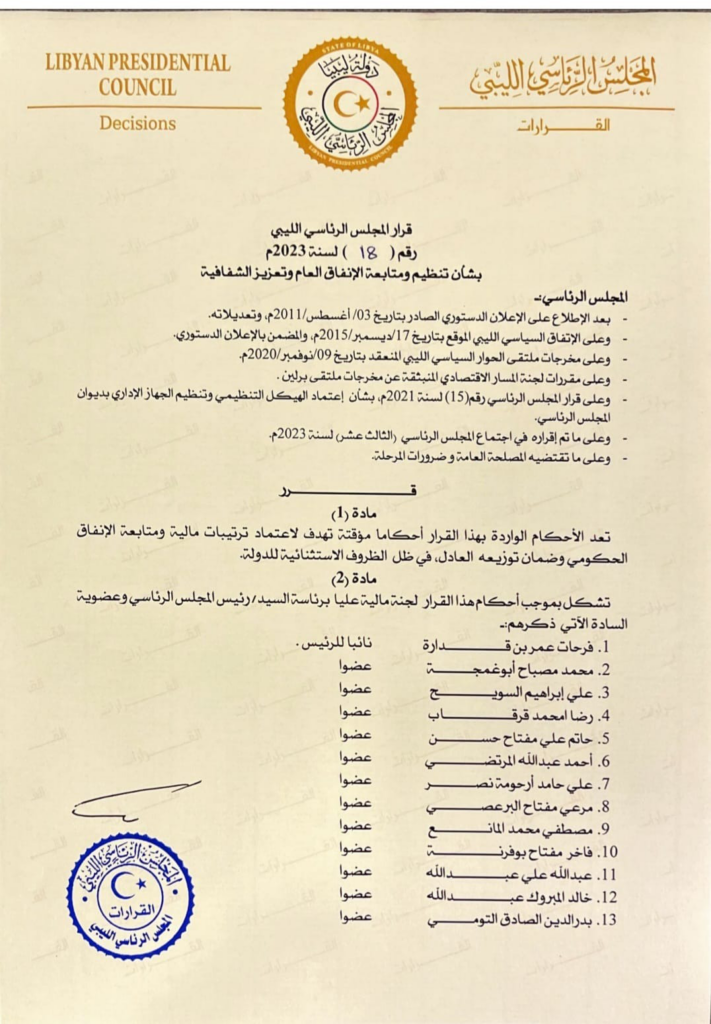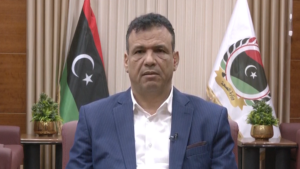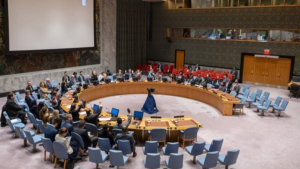The Presidential Council issued a decree to form a “high financial committee” headed by “Muhammad Menfi” and “Farhat Bengdara” as his deputy, and the membership of 16 others, including officials and ministers.
In the decree, the Presidential Council stated that the committee aims to adopt financial arrangements and monitor government spending, in addition to ensuring fair distribution of expenses.
The committee is mandated with approving aspects of public spending and expenditure in accordance with the principles of sound financial governance and fair distribution.
The committee is to monitor the state’s public revenues in order to verify the soundness and efficiency of its accumulation, as well as the soundness and efficiency of government spending in accordance with the committee’s guidelines.
The decree indicated that the committee is dedicated to relieving the public budget from political conflict, creating a suitable environment for holding elections, and ensuring fair distribution of sovereign resources’ revenues during the transitional political phase.
According to the decree, the committee takes its decisions regarding the tasks entrusted to it by a two-thirds majority of its members.

Threatening to shut down oil production
This decree was preceded by a wave of statements and events about the “fair distribution of wealth” and the beginning was from the head of the government located in the east and appointed by the House of Representatives (HoR), Osama Hammad, who announced that they had taken measures to seize oil revenues for the year 2022 and thereafter.
Hammad stressed that his government will resort to the judiciary to appoint a judicial guard over the seized funds, and that it will raise the red flag if necessary, prevent the flow of oil and gas, and declare force majeure until the procedures are completed.
Hammad’s statements were supported by the head of the HoR’s Energy and Resources Committee, Issa al-Araibi, who affirmed his support for Hammad’s move, in order to ensure a fair distribution of wealth, as he put it.
Al-Araibi called on the Ministry of Planning and Finance in Hammad government to take legal measures related to the administrative seizure of oil revenues for the year 2022 and thereafter, which he said exceeded 130 billion dinars.
Al-Araibi added in his statement that this procedure benefits the Libyan people, taking into account the provisions of Law 152 of 1970 and based on Article 8 of the Constitutional Declaration.”
However, these statements were met with a contradictory opinion from the US envoy to Libya, Richard Norland, who urged the Libyan political actors to withdraw threats to shut down oil production, saying that the occurrence of this would be very destructive to the Libyan economy and harm all Libyans, according to his statement.
The US envoy called on Libyan leaders to implement a comprehensive mechanism for managing incomes and distributing oil revenues without prejudice to Libya’s economic wellbeing or the apolitical nature of the National Oil Corporation.
This American position was described by Hammad in subsequent statements as interference in local Libyan affairs, calling on “Norland” to respect what he called the sovereignty of the Libyan judiciary and not to interfere by siding with any party.
The head of the Parliament’s Energy and Resources Committee, Al-Araibi, also denounced the statements of the US envoy that warned of the repercussions of a possible oil blockade.
Al-Araibi stated, “What matters to Norland is the flow of oil and gas without looking at the suffering of the people of Cyrenaica, Fezzan, and some areas in Tripoli, and does not pay attention to government corruption.”
While 70 members of the HoR announced their refusal of the statements of Richard Norland, in which he criticized the threat to shut down oil production.
The members expressed their support for Hammad’s move to seize oil revenues for the year 2022 and thereafter, denouncing what they claimed was “interference in internal affairs, especially the Libyan judiciary.”
Haftar joins the party
In the same context, Khalifa Haftar called in a speech for the formation of a high committee for financial arrangements that would be able to “manage public money in a fair manner.”
Haftar made it clear that the committee must be formed at the soonest, and if it was not possible for it to carry out its tasks for any reason, the “people will be ready”, according to his words.
Haftar added that the high committee is to be given a time frame until next August to accomplish its tasks, as the need has become urgent to take practical steps towards distributing oil revenues fairly.
A Blockade will be harmful
For his part, the Minister of Oil in the Government of National Unity (GNU), Mohammed Aoun, expressed his concern about renewed and repeated calls to disrupt oil production in the country, saying that the public will be the first to be harmed if such an event happens, whether through the loss of oil-importing clients, or the impact on power stations, which means that the situation will turn bitter.
Aoun warned, in a press statement, of the negative repercussions of any oil shutdown, considering that it would not be easy, given that now the country’s levels of oil and gas production are high, as he put it.
Aoun stressed that the people will be affected by the possible shutdown, warning as well that such a step may put the country at risk of driving away foreign investment.
Source: Statements





